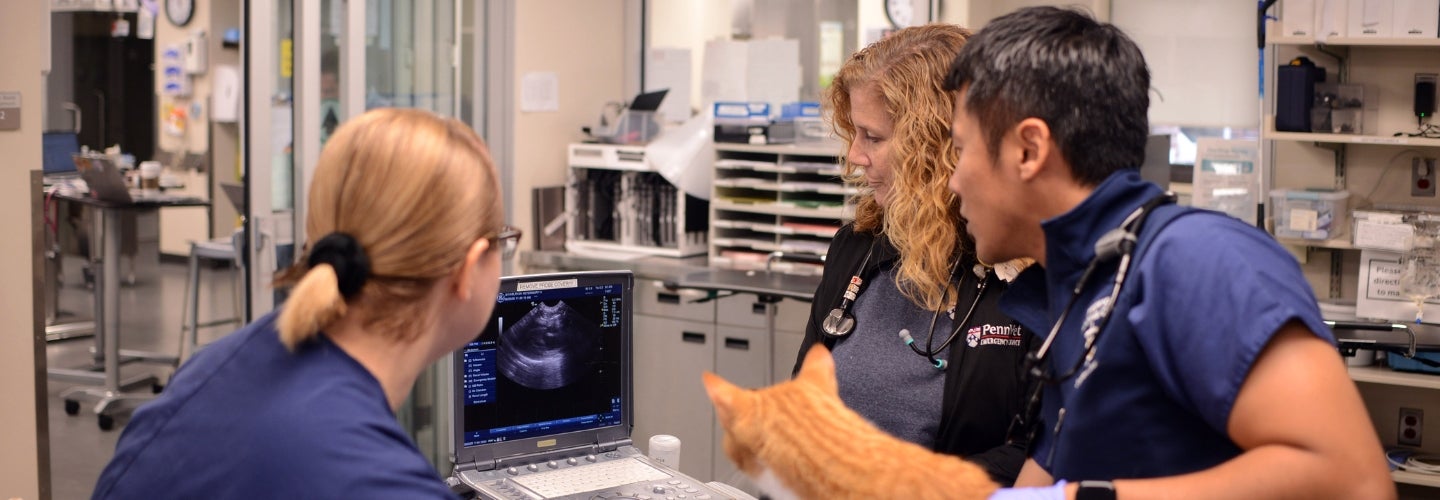
E&CC | Emergency Service
What we do
As one of the area’s most experienced and well-established emergency services, we offer an unsurpassed level of care that ensures patients have the best chance possible for survival and recovery. Our board-certified specialists and advanced trauma center provide life-saving care throughout the day and night, seven days a week, 365 days per year.

Our world-renowned faculty and staff are pioneers in research on trauma, shock, and other emergency conditions and have written numerous publications in emergency and critical care medicine. Additionally, our experienced staff supports this service, guaranteeing that your pet’s most up-to-date treatments are provided.
Ryan Hospital has some of the most advanced diagnostic capabilities in the country, which means quick evaluations on-site without the need to send samples to another location and wait for a response.
Our Services
Symptoms, Diagnosis, and Treatment
Coming to the emergency department can be a stressful and confusing time. Here’s a quick rundown of what you can expect during your visit. After the visit your veterinarian will send a letter to your primary or referring veterinarian explaining the details of the visit.
Triage
Upon arrival, your pet will be seen by a triage nurse or veterinary student who will prioritize care needs based on symptoms being experienced and how sick or injured your pet is. You will be asked for a brief history of what the problem is.
Often times the nurse will bring your pet to the treatment area for evaluation by a veterinarian or for continuous monitoring until the veterinarian can speak with you directly. If your pet needs immediate medical care, you will be asked for permission to start treatment immediately. This is called CONSENT FOR STABILIZATION.
Registration
The registration clerk takes information about you and your pet (name, address, age, breed, etc.), and your regular or referring veterinarian. After registration, the patient’s information (medical chart) is brought to the veterinary team.
History
History is extremely important for the veterinary team to be able to correctly diagnose and treat patients properly. You will be taken to a room where a veterinary student (or veterinarian) will ask you many questions. Often times the veterinarian will ask you additional questions for clarification. The veterinary team will need to know what the problems are, how long they have been present, what medications your pet is taking, and any pertinent medical history including previous illnesses, injuries, or surgeries, diet, exposure to other animals, and preventative care history.
Medical Care
Every pet is assigned a veterinary student and specially trained veterinarian; however, we are all here to help you, so do not hesitate to ask anyone for help. The veterinarian will perform a physical exam on your pet, review the medical record and history that was provided, and then spend time discussing the concerns that you have. During this consultation the veterinarian will discuss the plan for diagnostic tests (such as bloodwork and x-rays) and will recommend specific medical care.
If your pet is well enough to go home, you will receive verbal and printed out discharge instructions. If it is recommended that your pet be hospitalized, you will receive an estimate of the costs of care that is expected, as well as contact information so that you may call and check in on your pet. You will be asked to sign forms to consent for treatment as well as provide emergency numbers so that we can reach you at any time.
What to Expect When You Arrive
You can call us for updates on your pet throughout their emergency service stay. If your pet will be transferring to a different service in the morning, the veterinarian on that service will provide you with their personal contact information for continued updates. That veterinarian will call you in the morning once they have had a chance to review your pet’s full history and perform a full examination. Remember you can always call (215) 746-8911.
Sickest Pets First: If you notice that other clients are being seen before you, it’s because we need to treat the sickest pets first.
Feel Forgotten? If you think you’ve been overlooked, please ask someone for help. We will update you as often as possible.
If Your Pet Is Worsening: If your pet is waiting with you in the waiting area and you think your pet is worsening, please ask to speak to a nurse for a re-evaluation. If your pet is worsening, we will take your pet to the treatment area for closer monitoring and possibly start treatment immediately.
- Once you have discussed and agreed to a medical plan for your pet, you will need to sign consent forms as well as leave a deposit for care.
- Once the receptionists have completed this process they will ask you if you would like to visit with your pet. Some owners know that their pet will become more upset seeing them leave so choose not to visit.
- If you wish to visit your pet we will bring you to the treatment area to visit and see where your pet will be staying. Alternatively, sometimes one of our nurses can bring your dog out front to visit, depending on the medical status of your animal.
Please make sure to bring with you:
- A copy of any CD or flash drive, bloodwork, and medical record from all hospitals your pet has been treated at.
- All medications that your pet is taking. This is especially important if the medications are compounded.
- If your pet has ingested a toxin, it is VERY important that you bring the packaging so that we can read the chemical name from the label.
If your pet will be hospitalized
- Double-check your phone number, especially if it has been a while since you were here last.
- Bring all of your pet’s belongings home with you, including the pet carrier. These items can become misplaced and difficult to locate in our large hospital, especially if your pet will be treated by the different services we have available.
You’ll meet many different members of our medical team in the emergency department. Each person plays an important role in helping our patients at such a critical time.
Nurses — Our skilled certified veterinary technicians (CVT) will be the primary caregivers to your pet. They will ensure that your pet is comfortable throughout their stay with us. They will monitor your pet for signs of nausea, pain, or distress and will notify the veterinarian if anything is wrong. They will take your pet for walks outside to eliminate, and will make sure your pet is eating and drinking (when safe to do so). They perform the diagnostic tests and procedures that are ordered by the veterinarian and monitor your pet’s vitals regularly.
Students — Our veterinary students have already completed two or more years of veterinary school including coursework as well as hands on patient care. Like our nurses, their goal is to make sure your pet is comfortable and receiving the highest quality care. They perform diagnostic tests, treatments, procedures, and follow up calls to check up on you and your pet.
Interns and Residents — Interns and residents are veterinarians who have graduated from an accredited veterinary school. Some have practiced veterinary medicine at other hospitals before coming to Penn Vet to advance their education. Our residents, who specialize in Emergency and Critical Care Medicine, will complete four years of undergraduate training, four years of veterinary school, one year of internship, and three years of residency training.
Clinicians — The senior clinician is in charge of all patients in the emergency service. You may not see them or speak with them directly, but they are part of the veterinary team that will develop the final diagnostic and treatment plan for your pet. Our senior clinicians are leaders in their field, lecturing at international conferences, performing cutting edge research, and publishing research articles in internationally recognized journals.
Our Care Team

Service Head, Emergency
Deborah C. Mandell, VMD, DACVECC
Professor, Clinical Emergency & Critical Care
Veterinarians

Charles Garneau-So, MVB

Satoshi Haginoya, BVSc, DACVECC

Catalina Montealegre, VMD
Residents

Celeste Chen, DVM

Joseph Frame, DVM

Justin Hildebrand, DVM

Leanna Hoover, DVM

Allison O’Donnell, DVM

Sara Schatz, DVM

Erin Tack, DVM

Jordan Tarbutton, DVM

Brandon Weiss, DVM

Bridgette Zerbe, VMD
Tara Rodriguez, CVT
ES Veterinary Nursing Supervisor
Jeni Dohner, CVT, VTS (ECC)
Assistant Veterinary Nursing Supervisor
Mike Armine, CVT
ECT/ES
Sean Boswell, LVT
Crystal Branch-Wyman, LVT
Kelina Diaz, CVT
Savannah Friday, CVT
Hollie Funderburg, CVT
Erin Gordon, CVT
Frances Martinez, CVT
Renee (Justine) Nealen, CVT
Olivia Summerill, CVT
Evan Vattimo, CVT
Nicole C. Wood, CVT
Alyssa Curilla, ES Assistant
Rachel Mead, ES Assistant
About the Section
Emergency, Critical Care, and Extracorporeal Therapy
The Emergency, Critical Care (ICU), and Extracorporeal Therapy services at Ryan Hospital work together to provide an unsurpassed level of care that ensures your pet has the best chance of recovery from life-threatening diseases or situations.
The veterinarians, residents, interns, and nursing staff work in a team-oriented environment to provide the best possible care. Explore each of these services below for more information.
Red Cross-First Aid App
Penn Vet’s Deborah Mandell helped to develop the American Red Cross Pet First Aid App and serves as their national spokesperson and pet safety advisor.
Be ready for any emergency. Download this app for your iPhone or Android device directly from the iTunes or Google Play app stores.
Ryan Veterinary Hospital
Emergencies:
(215) 746-8911
By Appointment:
(215) 746-8387






